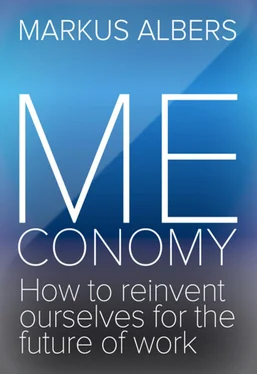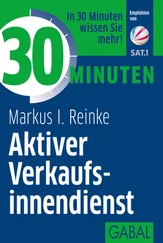1. It doesn’t matter how stable and big our employers used to be. Their future success and, consequently, our jobs are uncertain.
2. The barriers against the successful market entry of new players are lower than ever. Since no one knows how to proceed, it might as well be us who co-invent the future.
We are thrown back to depend on ourselves in a positive sense. The smallest meaningful unit that we can rely on in the knowledge society is our mind (i.e., us).
In this book, I dwell on ten pivotal developments that, in my opinion, will shape our work life and, thus, the world we live in during the years to come:
1) Established biographical routines and basic parameters of our life planning – such as permanent employment, safe pensions, 9-to-5 workdays, or traditional education – increasingly lose their value. More and more of what used to make our parents’ existence predictable has, at best, sentimental value for the generation of less-than-40-year-olds.
2) Many young people have reservations with regard to government-based structures. In the age of globalization, they take security promises with a grain of salt. They place more emphasis on their own initiative and entrepreneurship than on classic careers. Their motto is: If social standards cannot be maintained in the long run anyway, I at least want to be free.
3) Work will become increasingly mobile and flexible. We won’t spend the bulk of our life at the office anymore. This alteration of our work routines is predominantly a result of technological innovations that also lead to the development of alternative occupational areas. As knowledge, skills, and business models become outdated at an ever faster pace, we need to reinvent ourselves permanently. For us, the catchphrase “lifelong learning” is a tough reality.
4) We feel we are on our own. As a consequence, individualism as an aim in life gains more and more importance for many people. Others feel overwhelmed and left behind by the very same development.
5) This change implies a tremendous chance: The possibilities of communication provided by the Internet allow us more than just to find many like-minded people. At the same time, this technology also creates a huge laboratory of learning. The imparting of knowledge increasingly becomes free, global, individual, and socially organized.
6) Simultaneously, this communicative connection to the world allows us for the first time to turn our passions into professions and to make money with what inspires us. In the Internet, we find customers, like-minded people, and business models – yet we also encounter maximum competition. This not only means that we need to put more effort into taking charge of our lives but also that we are actually able to do so for the first time ever.
7) Learning things in order to apply them to practical work afterward isn’t enough anymore. In fact, we have to present ourselves as a brand and to use self-positioning in order to keep up within the global competition for workforce. In this context, making use of the Internet’s ability to connect and recalling our own strengths and passions will help us.
8) According to happiness researchers, we fulfill all requirements to be happy with this autonomous, diversified, yet also demanding way of structuring our work and life.
9) Both personal branding and the increasingly mobile and flexible nature of work allow us to choose places where we are happy and productive. Life and work gain independence from employers and places of residence. We become globally mobile, and this might make us happier.
10) As we increasingly decide for ourselves how, where, and with whom we make money, the search for meaning gains more importance. The trend to combine economical with social engagement grows stronger. We want to do good, be happy, and make money. In the old patriarchal, hierarchical, and inflexible working world, these aims were often mutually exclusive. In the Meconomy, their combination is almost a precondition for success.
All of this raises a number of questions that I shall deal with in this book. The first part “What is different today?” summarizes the changes that characterize the environment of the Meconomy. If and how these changes can make us more satisfied is discussed in the second section “What makes me happy?”. The third chapter, titled “What Could I Become,” tells us what we have to know in order to be successful in the Meconomy and how we acquire that knowledge. The question asked in the fourth section is: “How will I work?” Here, I use numerous examples and studies to explain why we can and must make our passions our professions. That these professions – along with a healthy dose of wanderlust – might lead us to distant places is described in the fifth chapter “Where do I want to live?”, which deals with our new global mobility. Finally, the sixth part elaborates on why the Meconomy does not entail a purely egoistic philosophy but, to the contrary, promotes a new culture of empathy and social engagement. At the same time, the question is raised which role the government with all its institutions might play in this development and which political reforms have become necessary now.
“Meconomy” is definitely a call to action, an optimistic counterpart to apocalyptic scenarios, crisis depressions, and doctrines of passiveness that suggest we “weather the storm” and “wait and see.” It is a tool kit for life – an invitation not to suffer from existence but to actively shape it. It addresses both individuals who want to take charge of their own careers as well as employers who want to find out which changes their companies will be facing regarding the needs of their highly qualified employees. Combining numerous practical examples from daily life with easy-to-understand theoretical support, the book summarizes the current state of a discussion led by academics, entrepreneurs, and practitioners. We live in confusing times. However, I don’t want to complain about that. Rather, I want to explain why things can be different, what we can learn from them, and how we can use recent developments to build a better life for us and our children.
WHAT IS DIFFERENT TODAY?
“This is the modern world that I’ve learnt about
This is the modern world, we don’t need no one
To tell us what is right or wrong -
Say what you like cause I don’t care
I know where I am and going too
It’s somewhere I won’t preview”
The Jam: “(This is) The Modern World”
The End of the Office and Its Consequences
How do we actually want to live? This question is not only on the mind of young professionals, but also of that older generation that has always worked a lot and started realizing during the crisis – if not earlier – that a life spent predominantly in the office isn’t necessarily an extremely fulfilling one. “Since the 1970s, it has become somewhat unfashionable to have time on your hands,” writes journalist Claudia Voigt in the German Kulturspiegel magazine. “Those who had time on their hands were either old or lost since the days they were young.” We have been searching for happiness in our workplaces in vain and for too long. We have spent ten or twelve hours in the office, bending over backwards. “In this respect, the current economic crisis has something good about it,” says Voigt. “It is profound and world-shattering enough to suddenly make room for questions such as: How do we live? What is important to us and what are our values? How much longer is this supposed to go on? And: How do we actually want to live?”
Voigt makes an argument for ultra-flexible and, most notably, shorter working hours as smart ideas can be developed just as well in a 30-hour week. She pleads for going to the office only to work – not to drink coffee, read private e-mails, or download music from the Net. She rails against the requirement to be present permanently and to do overtime in executive positions. She likes the idea of trading money for time and of having the freedom to use that time as you like. Voigt’s article is important as it describes a connection between our new working reality, the economic crisis, and the search for meaning that I agree with: “How do we want to live? Lots of work and little time: For a long time, this was regarded as the only way to a successful existence, yet the crisis will change this – thank goodness.” Besides, this connection raises a question that I will try to answer in this book: “What will people do who already have stopped being present at the office around the clock?”
Читать дальше












